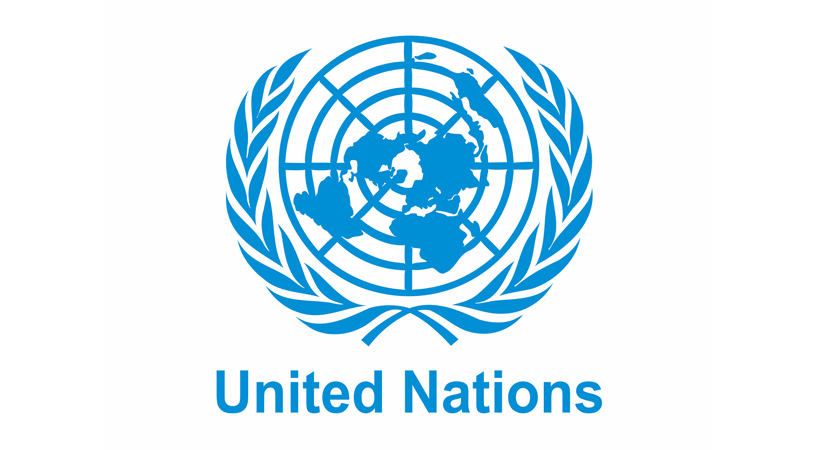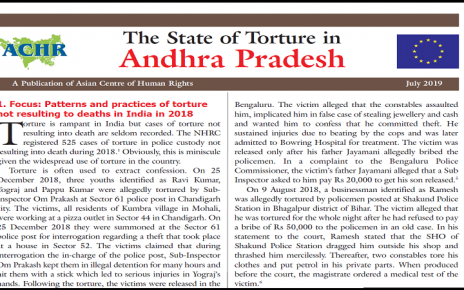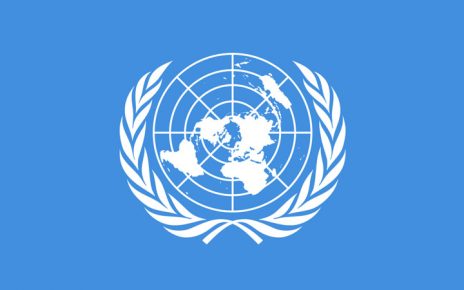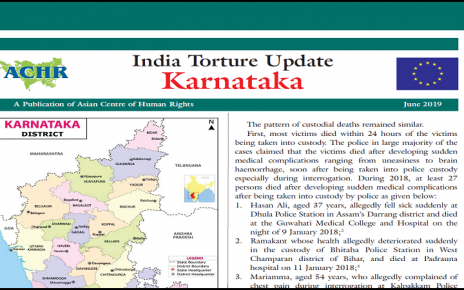UN Committee against Torture
The 64th session of the UN Committee against Torture (CAT) was held in Geneva from 23 July to 10 August 2018. The Committee adopted concluding observations and recommendations on the reports of Mauritania, Russian Federation, Seychelles, and Chile on the implementation of the provisions of the Convention against Torture and Other Cruel, Inhuman or Degrading Treatment or Punishment (UNCAT).
i. CAT’s concluding observations and recommendations on Russia
The Committee against Torture (CAT) considered the sixth periodic report of the Russian Federation (CAT/C/RUS/6) and adopted the present concluding observations at its 1676th and 1677th meetings, held on 8 August 2018.[1] The Committee regretted that the State party has not yet criminalized torture as an independent crime in the Criminal Code, and that the definition of torture in the annotation to article 117 does not contain all the elements set out in article 1 of the UNCAT. The Committee expressed concerns that acts of torture or ill-treatment by public officials are usually prosecuted under article 286 of the Criminal Code, abuse of authority, which does not reflect the grave nature of the crime of torture and does not allow the Committee to monitor the State party’s prosecution of cases of torture.
The Committee further expressed concerns that fundamental legal safeguards against torture for detained persons often do not apply from the very outset of the deprivation of liberty and sometimes are not respected at all. The Committee also regretted that legal counsels are often denied access to their clients in detention; that free legal aid is not always available for indigent persons, particularly in remote regions; and that judges usually do not reject confessions taken without a lawyer present. The Committee remained concerned that police and prison doctors reportedly often failed or refused to conduct a proper and confidential examination on injuries sustained from torture or ill-treatment and that a prisoner’s request to receive an independent medical examination was often rejected by prison administration.
The Committee was “deeply concerned at numerous reliable reports of the practice of torture and ill-treatment in the State party, including as a means to extract confessions, and many recent reports documenting cases of torture, such as the deaths of Valery Pshenichny in 2018 and Ruslan Sayfutdinov in 2017”. The Committee said allegations of torture rarely resulted in criminal prosecutions and that even when prosecuted, the perpetrators were charged with simple assault or abuse of authority. There is no disaggregated information on the number of complaints received alleging torture and ill-treatment by public officials, the number of complaints investigated and any prosecutions brought against the perpetrators. The Committee urged the State party to combat impunity concerning torture and ill-treatment cases, including by ensuring that high-level government officials publicly and unambiguously affirm that torture will not be tolerated and that anyone committing acts of torture or complicit or acquiescent in torture, including those with command responsibility, will be criminally prosecuted for torture.
The Committee also expressed concern about cases of harassment, abduction, arbitrary detention, torture, ill-treatment and killings of human rights defenders, lawyers, journalists and political opponents, and the lack of effective investigation into such acts, including in the high-profile cases of the 2006 killing of Anna Politkovskaya and the 2009 killing of Natalia Estemirova. The Committee also expressed concern that the State party informed the Committee that the submission of alternative reports by the Memorial Centre and the Public Verdict Foundation to the Committee in 2012 was a political activity and justified their registration as “foreign agents.” In this regard, the Committee is concerned by consistent reports that the “foreign agent law” and “undesirable foreign and international organizations law” are often used as a means of administrative harassment against human rights organizations by forcing them to reduce and eventually cease their activities. The Committee recommended that the State party should ensure that human rights defenders, journalists and lawyers are not subjected to reprisals, including administrative harassment, for their communication with or provision of information to the United Nations treaty bodies, including this Committee.
The Committee expressed concern that the State party has not yet ratified the Optional
Protocol to the Convention against Torture (OPCAT) and thus has not established a national preventive mechanism. The Committee recommended to the State party to ratify the Optional Protocol to the Convention against Torture (OPCAT) and establish a national preventive mechanism in accordance with the OPCAT.
ii. CAT’s concluding observations and recommendations on Seychelles
The Committee against Torture considered the initial report of Seychelles (CAT/C/SYC/1) and adopted the following concluding observations at its 1677th and 1678th meetings (CAT/C/SR.1677 and CAT/C/SR.1678) held on 8 and 9 August 2018.[2] The Committee regretted that the submission of the State party’s initial report was 25 years late and was received only during the first week of its 64th session.
The Committee was concerned that there are no provisions specifically prohibiting torture, cruel, inhuman or degrading treatment or punishment in the criminal laws of Seychelles, and that there is no definition of torture in its laws in line with article 1 of the UNCAT. The Committee recommended that the State party should revise its legislation in order to: (a) Amend the Penal Code in order to introduce the specific crime of torture; in addition, expedite the ongoing pending amendments of the Prison Act and the Police Forces Act; (b) Introduce a definition of torture that includes all the elements set out in article 1 of the Convention; (c) Ensure that both the crime of torture and the attempt to commit such a crime are punishable with appropriate penalties, which take into account the gravity of their nature, as set out in article 4 (2) of the Convention; (d) Ensure that the prohibition of torture is absolute and non-derogable and that no exceptional circumstances, including a state of emergency or threat of war, can be used to justify the use of torture; (e) Ensure, in keeping with article 2 (3) of the Convention, that obedience to superior orders cannot be invoked to justify torture, and guarantee in practice the right of all law enforcement officials and military personnel to refuse to execute, as subordinates, an order from their superior officers that would result in a violation of the Convention; and (f) Ensure that there is no statute of limitations for the crime of torture and that, where torture offences are concerned, the granting of amnesty and pardon is inadmissible.
The Committee also urged the State Party to (a) amend national legislation, including the Code of Criminal Procedure, in order to ensure, in law and practice, that any statement resulting from torture or cruel, inhuman or degrading treatment is not invoked as evidence; (b) ensure that courts dismiss in practice all cases in which evidence was obtained as a result of torture or cruel, inhuman or degrading treatment; (c) prosecute and punish officials who may have allowed evidence to be obtained as a result of torture or cruel, inhuman or degrading treatment; (d) provide necessary training to law enforcement and judiciary officials regarding the inadmissibility of coerced confessions in court; and (e) ensure that officials who extract coerced confessions, including persons liable under the principle of command responsibility, are brought to justice, prosecuted and punished accordingly.
ENDNOTES:
[1]. Committee against Torture, “Concluding observations on the sixth periodic report of the Russian Federation” (Advance Unedited Version), CAT/C/RUS/CO/6
[2]. Committee against Torture, “Concluding observations on the initial report of Seychelles” (Advance Unedited Version), CAT/C/SYC/CO/1




